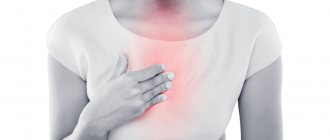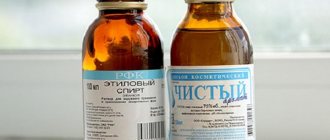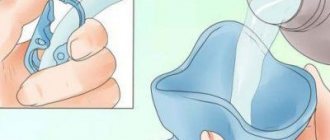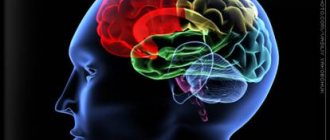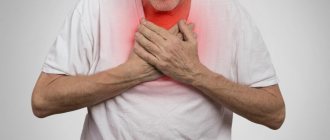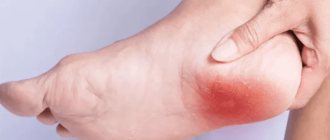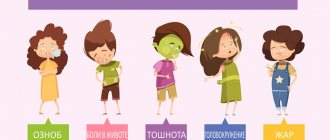Cases of poisoning with substandard products, medicines, alcohol, poisonous mushrooms and chemicals can occur in every family or group. The first thing to do in case of poisoning is to seek medical help.
If it cannot be obtained immediately, first aid to a person with signs of poisoning is provided by close people. They must know what to do in case of poisoning in order to reduce its consequences for the life and health of the affected person.
Food poisoning
Vomiting and diarrhea are symptoms of food poisoning
When poorly prepared or improperly stored food enters the body, food poisoning occurs. It can be of infectious origin, when symptoms of poisoning are caused by waste products of viruses, protozoa and bacteria, and non-infectious origin, when poisons and chemical compounds have entered food products.
Signs of food poisoning appear after a short time. These include:
- Temperature rises to 39-40C.
- Loss of appetite, general malaise.
- Vomiting, profuse vomiting.
- Sharp pain in the epigastric region, often spasmodic in nature.
- Dizziness, general weakness.
- Decreased blood pressure.
- Profuse salivation.
- Signs of dehydration.
- Visual impairment, the appearance of hallucinations in severe cases.
- For complications: paralysis, paresis, loss of consciousness.
With timely provision of medical care, these manifestations gradually decrease. After three to four days, there is a significant improvement in the general condition. In severe cases, food poisoning can result in coma and death.
Food poisoning is especially dangerous for those whose bodies are weakened by chronic diseases, for children, pregnant women and the elderly.
Sources
- Pellegrino JL., Krob JL., Orkin A. First Aid Education for Opioid Overdose Poisoning: Scoping Review. // Cureus - 2022 - Vol13 - N1 - p.e12454; PMID:33552772
- Borra V., Avau B., De Paepe P., Vandekerckhove P., De Buck E. Is placing a victim in the left lateral decubitus position an effective first aid intervention for acute oral poisoning? A systematic review. // Clin Toxicol (Phila) - 2022 - Vol57 - N7 - p.603-616; PMID:30784327
- Avau B., Borra V., Vanhove AC., Vandekerckhove P., De Paepe P., De Buck E. First aid interventions by laypeople for acute oral poisoning. // Cochrane Database Syst Rev - 2022 - Vol12 - NNULL - p.CD013230; PMID:30565220
- Yue Y., Pan X., Zhang S., Jin J., Wang W., Wang D., Han D., Wang G., Hu Q., Kang J., Ding S., Yang Y., Bu H ., Guo Y. A Randomized Controlled Trial of Puncturing and Bloodletting at Twelve Hand Jing Points to Treat Acute Carbon Monoxide Poisoning as Adjunct to First Aid Treatment: A Study Protocol. // Evid Based Complement Alternat Med - 2015 - Vol2015 - NNULL - p.827305; PMID:26339271
- Goktas S., Yildirim G., Kose S., Yildirim S., Ozhan F., Senturan L. First Aid Knowledge of University Students in Poisoning Cases. // Turk J Emerg Med - 2014 - Vol14 - N4 - p.153-9; PMID:27437513
Types of intestinal infection
- Salmonellosis - caused by salmonella, enters the body along with contaminated meat and eggs. Characteristic symptoms are diarrhea, fever, pain and abdominal cramps.
- Dysentery - caused by Shigella, enters the body through unwashed hands. Affects the large intestine. Symptoms: bloody diarrhea, fever.
- Listeriosis - caused by listeria, enters the body through canned food, raw meat, and food. The symptoms are similar to those of the flu, complications are meningitis.
- Cholera - caused by Vibrio cholerae, comes from contaminated water, seafood and food. It affects the small intestine; symptoms include vomiting, diarrhea, and rapid dehydration.
- E. coli - enters the body with poorly processed foods. Symptoms are fever, acute abdominal pain, high temperature.
It may take quite a long time before a person poisoned by poor-quality food receives medical attention. During this time period, it is necessary to take emergency measures in order to free the body from the source of poisoning, to prevent the rapid spread of toxins in the gastrointestinal tract, in the blood and in the nervous system.
Emergency measures in case of poisoning
Washing - help with poisoning
You should not take medications to stop diarrhea without consulting a doctor. Diarrhea is the body's reaction to the action of toxins, as the intestines try to get rid of them. Uncontrolled use of antidiarrheals leads to the fact that toxins, remaining in the intestines, will begin to be actively absorbed into the blood through its walls, and will aggravate the already serious condition of the affected person.
- Gastric lavage. To do this, you need to drink 2.5-3 liters of water in which soda or a weak solution of manganese is dissolved, induce vomiting until clean water free of blood and mucus appears in the vomit.
- Make an enema using an Esmarch mug with a pink manganese solution or salt solution (1 tsp per liter of water).
- Take enterosorbents: Smecta, Enterosgel, activated carbon.
- Replenish fluid loss by taking Regidron, rosehip decoction, and chamomile. To prevent dehydration, it is recommended to drink plenty of still mineral water and green tea.
Symptoms of drug intoxication
Symptoms of drug poisoning can be very different; the manifestations are mainly determined by the type of drug. A distinctive feature of drug poisoning is its detrimental effect on the central nervous system. Common symptoms include weakness, lethargy, decreased reaction time, or severe psychomotor agitation. Cases of loss of consciousness are known in practice.
One of the common symptoms includes severe headaches. They can even be triggered by hormonal agents, especially if the patient has a predisposition to periodic headaches. When taking hormones, compensatory mechanisms are disrupted, which normally maintain the absence of symptoms. This occurs when taking a large dose of drugs containing caffeine, nitrates, hydralazine, bronchodilators, etc.
An overdose of antibacterial drugs is often accompanied by negative manifestations from the gastrointestinal tract: diarrhea, abdominal pain, increased gas formation. For example, an overdose of penicillin antibiotics leads to rash, vomiting, and convulsions. Excess chloramphenicol can cause heart failure.
Symptoms of poisoning with drugs used to normalize cardiovascular function include:
- heart rhythm disturbance;
- spasms and bradycardia;
- gagging.
An overdose of nonsteroidal anti-inflammatory drugs affects the central nervous system: depression of consciousness, lethargy, lethargy, sleep disturbances, etc. are observed. The use of large amounts of antihistamines (decongestants, antiallergic) drugs can provoke weakness, dilated pupils, hallucinations, and psychomotor agitation.
Poisoning with tranquilizers is dangerous due to disturbances in heart rhythm, suppression of central nervous system function and respiratory disorders, convulsions, severe tremors of the limbs, and hallucinations. The patient's speech may be incoherent and slurred.
It is important to understand that manifestations depend not only on the presence of a particular active substance in the blood, but also on its concentration. Even traditionally beneficial components, such as vitamins, can be harmful and lead to the need for detoxification. What one person can easily endure, another will endure with a whole range of unpleasant manifestations.
Poisoning with poisonous mushrooms
Clean water is an aid in case of poisoning
The insidiousness of this poisoning lies in the fact that symptoms may not appear immediately, but after a few days, when the consequences may be irreversible. You can also get poisoned by so-called conditionally edible mushrooms.
They are safe after proper processing, but can be poisonous in their raw form and in the form of pickles and marinades. Signs of mushroom poisoning may appear as early as 5-6 hours after poisoning. These are the symptoms:
- severe diarrhea (up to 15 times a day)
- vomit
- excessive urination
- extreme thirst
- convulsions
- increased heart rate
- increased sweating
- hallucinations
- suffocation
- heavy salivation
All these signs can increase with alcohol consumption. If poisoning occurs with mushrooms such as thin mushroom, lines, false mushrooms, pale toadstool, galerina, white fly agaric, after apparent relief, jaundice occurs. A poisoned person has impaired liver function that is incompatible with life.
If medical help is sought in a timely manner, almost all such poisonings can be successfully treated, with the exception of poisoning by toadstool, against the poison of which there are no adequate protective measures.
When poisoned by inedible species of spider webs, symptoms of poisoning may occur 5-14 days after the poison enters the body. The main blow in this type of mushroom poisoning falls on the kidneys, which stop functioning, after which death occurs. Symptoms of spider web poisoning:
- increased amount of urine produced
- stomach pain
- vomit
- dry mouth
Poisoning with fly agaric species may result in hallucinations, delusions, and an altered state of consciousness bordering on insanity. First aid for poisoning with poisonous mushrooms:
- Induce vomiting by gastric lavage.
- Take enterosorbents (Carbolen, Enterosgel, white clay, Smecta).
- Lay the victim down, give him strong sweet tea, and apply a heating pad to his feet.
In order not to be at risk of poisoning from poisonous mushrooms, you should not collect or prepare mushrooms whose safety is in doubt. You cannot collect old mushrooms in whose bodies the process of protein decay has begun. Collected mushrooms must be processed immediately, otherwise they become unsuitable for food.
In what cases should you consult a doctor?
Usually, unpleasant symptoms that arise as a result of intoxication of the body with low-quality products disappear on their own after 5 - 7 days.
Let's consider cases in which it is necessary to contact a medical institution so that the doctor prescribes the correct treatment:
- Signs of intoxication do not go away for more than a week.
- Severe diarrhea with water and vomiting after eating.
- The poisoning occurred due to the consumption of mushrooms.
- An elderly person or a small child has been poisoned.
- The victim has an elevated body temperature.
- Severe pain in the head or other organs.
It is important! If intoxication of the body occurs due to eating low-quality canned food, first medical aid for food poisoning should be provided immediately. This measure is necessary to prevent botulism, which can be fatal.
Alcohol poisoning
Vomiting is the first sign of poisoning
Distribution of surrogate and intemperance in drinking alcoholic beverages can easily lead to poisoning. Its complication can be death. Signs of poisoning may include:
- loss of consciousness
- cardiac dysfunction
- severe vomiting
- blindness due to damage to the optic nerve
- labored breathing
- increased heart rate
Emergency measures that can be applied to a person who has been poisoned by alcohol do not differ from those for any poisoning. It is necessary to reduce the concentration of alcohol in the stomach. To do this, induce vomiting, wash the stomach with a solution of soda or manganese in a weak concentration. Before the ambulance arrives, the victim is taken out into the fresh air and freed from tight clothing, a tie, and a scarf.
To alleviate the condition, you can apply a cold compress or ice to his head. You can put mustard plasters on the back of the head, calves, feet, let them sniff ammonia, and wipe the temples with it. To enhance the effect, give a solution of ammonia in cold water to drink (10 drops of ammonia per glass of water). These measures should significantly improve the victim's condition.
Features of first aid for poisoning in children
Drug poisoning is especially dangerous
For no one is poisoning as dangerous as for children. Along with vomiting and diarrhea, dehydration begins, which is very dangerous and can lead to serious consequences in a short time. Children's body weight is small, which means that the concentration of the toxic substance in their body is initially higher than in adults. The very first thing to do is seek medical help.
Symptoms of poisoning in children are similar to those seen in adults, only they occur faster and are much more difficult for children to tolerate. While waiting for a doctor, you need to take emergency measures:
- Try to rinse the stomach and induce vomiting by drinking large amounts of boiled water with a weak solution of manganese.
- If you cannot induce vomiting, press on the root of the tongue with your finger or a teaspoon.
- Give the baby absorbents: Smecta, activated carbon (1 tablet per 10 kg of weight), Regidron to prevent dehydration.
- Lay the child on his side to avoid choking on vomit, cover with a blanket.
- Give plenty of fluids (sweet tea, water).
- If the temperature rises, do not take medications without consulting a doctor; you can wipe the child with a napkin soaked in water acidified with vinegar.
Treatment
Treatment of food poisoning must be comprehensive. To do this, you must follow a strict diet and take the necessary medications. You can also turn to traditional methods.
Medications:
- Activated carbon (relieves symptoms of intoxication, relieves nausea).
- Enterosgel (adsorbs toxic substances and promotes their removal from the body).
- Rehydrog (a drug for preparing a water-salt solution necessary to combat dehydration).
- Linex (normalizes the functioning of intestinal microflora).
In severe cases, it is possible to take antibacterial drugs, but they must be prescribed by a specialist.
Folk remedies are also successfully used to treat food poisoning. The most commonly used decoctions are dill with honey, wormwood, marshmallow roots, yarrow, cinnamon tincture and ginger tea.
The diet involves fasting on the first day of illness. Then you should gradually introduce oatmeal in water, boiled, pureed vegetables, weak fish and meat broths, crackers, and lean meat into the diet. Drinks allowed include dried fruit compotes, herbal teas, jelly, fruit drinks, and boiled water.
Until complete recovery, you should exclude pickles, spices, fatty and fried foods, mushrooms, sweets and various sauces from your diet.
Urgent measures for poisoning in pregnant women
Poisoning in pregnant women is dangerous because of its complications, which are characteristic only of this condition:
- Dehydration can lead to thickening of the blood and, as a result, a risk of blood clots in the veins of the legs.
- A decrease in total blood volume from dehydration leads to the risk of miscarriage due to the accumulation of oxytocin.
- Diarrhea and vomiting deprive a woman’s body of the substances, vitamins, and minerals she needs.
- There is a danger of toxins penetrating the placental barrier.
All prescriptions for a pregnant woman are made only by the attending physician. The first emergency measures may be taking sorbents; it is safest to take Smecta. It is not recommended for pregnant women to lavage their stomach due to the risk of miscarriage.
Replenishing lost fluid is the most important task. You need to drink more often, albeit in small portions. This could be still mineral water or sweet tea.
Poisoning can be caused by various reasons. Timely and correctly provided first aid can save the victim’s life and health. Depending on the causes of poisoning, symptoms and tactics of assistance vary. After taking measures, you should definitely consult a doctor.

